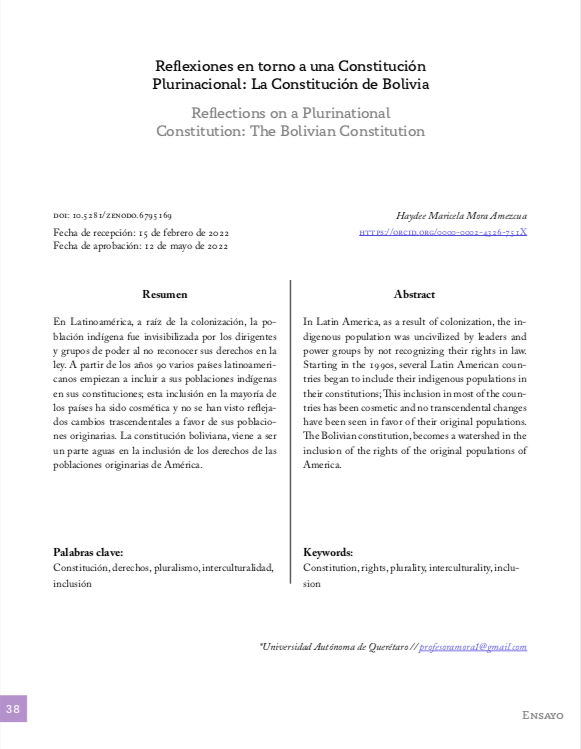
Keywords
rights
plurality
interculturality
inclusion
Abstract
In Latin America, as a result of colonization, the indigenous population was uncivilized by leaders and power groups by not recognizing their rights in law. Starting in the 1990s, several Latin American countries began to include their indigenous populations in their constitutions; This inclusion in most of the countries has been cosmetic and no transcendental changes have been seen in favor of their original populations. The Bolivian constitution, becomes a watershed in the inclusion of the rights of the original populations of America.

This work is licensed under a Creative Commons Attribution-NonCommercial-ShareAlike 4.0 International License.
Copyright (c) 2022 ALBORES
Similar Articles
- Mario Armando Vázquez Soriano, Editorial , Albores: Vol. 3 No. 5 (2024): Albores. Revista de Ciencias Políticas y Sociales
- Iván Patricio Ríos Sangucho, Discourses of inclusion, difference and normalization: The concept of inclusion in the construction of people with disabilities , Albores: Vol. 3 No. 5 (2024): Albores. Revista de Ciencias Políticas y Sociales
- Gerardo Cantú Sanders, Thinking of social rights as the center of human rights , Albores: Vol. 2 No. 3 (2023): Albores. Revista de Ciencias Políticas y Sociales
- María del Pilar Hernández Limonchi, Approach to indigenous youth problems in the Totonacapan of Puebla , Albores: Vol. 2 No. 2 (2023): Albores. Revista de Ciencias Políticas y Sociales
- José Antonio Carrera Barroso, Pedro Rafael Constantino Echeverría, Political transnationalism and the struggle for representation: #RedVotoChilango, a transnational network , Albores: Vol. 2 No. 2 (2023): Albores. Revista de Ciencias Políticas y Sociales
- Lourdes Leticia Machado Balbuena, Williams Chavero Jiménez, Juan Pedro Horta Sánchez, Mariana Itzel Nava Rodríguez, Impact of information and communication technology (ICT) on the child and adolescent population during the COVID-19 pandemic: Analysis from a bioethical perspective , Albores: Vol. 3 No. 4 (2024): Albores. Revista de Ciencias Políticas y Sociales
- Gabriel de Jesús Gorjón Gómez, Moisés David López Pérez, Telework and its possible regulation in Nicaragua's labor , Albores: Vol. 3 No. 5 (2024): Albores. Revista de Ciencias Políticas y Sociales
You may also start an advanced similarity search for this article.
Most read articles by the same author(s)
- Iván Patricio Ríos Sangucho, Discourses of inclusion, difference and normalization: The concept of inclusion in the construction of people with disabilities , Albores: Vol. 3 No. 5 (2024): Albores. Revista de Ciencias Políticas y Sociales
- Ingrid Alejandra Flores Solis, Urban cycling as a mobility option in Mexico City , Albores: Vol. 2 No. 3 (2023): Albores. Revista de Ciencias Políticas y Sociales
- Roberto Daniel Pérez García, Notes on lynching: an approach to discuss its definition and classification from Mexico , Albores: Vol. 2 No. 3 (2023): Albores. Revista de Ciencias Políticas y Sociales
- Luis Enrique Santamaría Luna, Socialization and subjectivity as critical tools to reflect on gender dynamics , Albores: Vol. 3 No. 4 (2024): Albores. Revista de Ciencias Políticas y Sociales
- Ricardo Ordaz Vega, A brief comparison of redistributive policies in John Rawls and James M. Buchanan , Albores: Vol. 1 No. 1 (2022): Albores. Revista de Ciencias Políticas y Sociales
- Mariana Chavez Castañeda, Betsabée Fortanell Trejo, Daniel Martínez Sahagún, Multidimensional model for the study of native digital media , Albores: Vol. 3 No. 4 (2024): Albores. Revista de Ciencias Políticas y Sociales
- María del Pilar Hernández Limonchi, Approach to indigenous youth problems in the Totonacapan of Puebla , Albores: Vol. 2 No. 2 (2023): Albores. Revista de Ciencias Políticas y Sociales
- Mariana Rodriguez Castañeda, The trans* experience in Latin American young adult literature, a (de)constructive instrument , Albores: Vol. 3 No. 4 (2024): Albores. Revista de Ciencias Políticas y Sociales
- Héctor Gutiérrez Sánchez, Party and evaluation of candidates as determinants of student’s vote , Albores: Vol. 1 No. 1 (2022): Albores. Revista de Ciencias Políticas y Sociales
- Gabriel de Jesús Gorjón Gómez, Moisés David López Pérez, Telework and its possible regulation in Nicaragua's labor , Albores: Vol. 3 No. 5 (2024): Albores. Revista de Ciencias Políticas y Sociales

